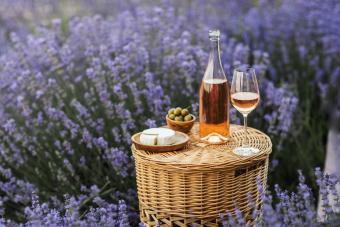
Wines don't last forever, especially once they've been opened. As soon as you pull the cork out on a bottle, it begins to deteriorate with exposure to oxygen. The rate of deterioration depends on a few factors. How long a wine lasts after opening really depends on the specific wine and what steps you've taken (or haven't taken) to extend its shelf life.
Factors That Affect a Wine's Shelf Life
Unfortunately, there is no single number of hours or days that applies to all bottles of wines. How long a wine lasts once opened really depends on the individual bottle, how it was made, and what steps are taken towards preserving the wine. To better estimate how long your wine may last once opened, it's important to look at a few different factors.
Oxidation
A key factor at play when it comes to a wine's shelf life once opened is its exposure to oxygen. Prior to opening, the cork seals the wine in the bottle, creating an air-tight space where the wine receives little or no oxygen, preserving it. Once the cork is removed, however, air reaches the wine and deterioration begins immediately.
Oxidation has both a positive and a negative effect on wine. For instance, some aged red wines need to breathe in order to soften tannins and open up the flavors, while other wines may need a few minutes of oxygen exposure to let reductive qualities dissipate. In the case of keeping an opened wine bottle for a matter of days, however, oxidation causes aromas and flavors to go from fresh, vibrant, and bright to muted, dull, and stale. The color reflects this oxidation, as well, with whites turning darker and red wines turning an unpleasant shade of brick brown.

Sulfites
Ah, the polarizing word in the wine world, sulfites. While sulfites are naturally occurring in grapes and therefore exist in all wines, the addition of extra sulfites varies from winemaker to winemaker and year to year. Ultimately, sulfites help to stabilize a wine, getting it ready to travel across the country, over an ocean, and on a truck, to arrive on the shelf at your local bottle shop still intact and of good quality.
Natural wines typically have less than 25 parts per million (ppm) sulfites added, and therefore are more alive and susceptible to changing conditions, such as temperature fluctuation and movement. Commercially produced industrial wines can be loaded up with 300 ppm and may last longer once opened because of it. That being said, a high-quality, natural wine can last a week once opened, too, if stored properly.
Age and Tannins
Youthful, strongly tannic wines typically last longer after opening than lighter reds, those with fewer tannins, and those that have been well-aged. For example, a young Bordeaux less than 10 years of age may last for a week, while a well-aged Bordeaux with soft tannins and a few decades under its belt may begin to degrade from oxidation immediately. Fruity reds, such as Boujoulais Noveau, will also degrade more quickly. Delicate reds like a soft Burgundy or pinot noir may also degrade from oxidation more rapidly, as well.
Sugar and Alcohol Content
Both sugar and alcohol act as preservatives, slowing oxidation. Therefore, dessert wines like Eiswein and Sauternes will likely keep longer than a dry riesling. The same goes for fortified wines, such as Sherry or Port. The higher alcohol content can extend the shelf life a bit when the wine is properly stored.
Decanting, Aerating and Amount in Bottle
The less wine remaining in the bottle, the more air there is in the bottle with the wine, leading to quicker in-bottle oxidation. Likewise, if you have decanted or aerated the wine, it's best to drink it that day, as the entire wine has intentionally been exposed to lots of oxygen at that point.
Tips For Making Your Wine Last
If it's one of those evenings, you open that second bottle a little too late and it's lingering on the table, don't count it out. There are a number of ways to ensure your bottle retains all of its vibrancy (or most of it, anyway) by slowing the oxidation process.

- First of all, while drinking the bottle over the course of an evening, keep it corked in between pours. This minimizes its exposure to oxygen.
- Once opened, ALWAYS store the wine in the refrigerator. This helps slow down the oxidation in red, white, orange, rosé, and sparkling wines.
- Use a vacuum wine preserver, which allows you to pump excess air out of the bottle to slow down oxidation.
Drink It or Chill It
As a general rule of thumb, you will be able to preserve an open bottle of wine for about three days, with certain bottles lasting longer and others lasting for shorter durations. If you have an absolute gem of a bottle, plan to open it and drink it rather than trying to extend it over a week's time. That being said, following the above steps will help preserve the wine's freshness, extending its shelf life from anywhere between one to five days. So show that opened bottle some love and throw it in the fridge!







